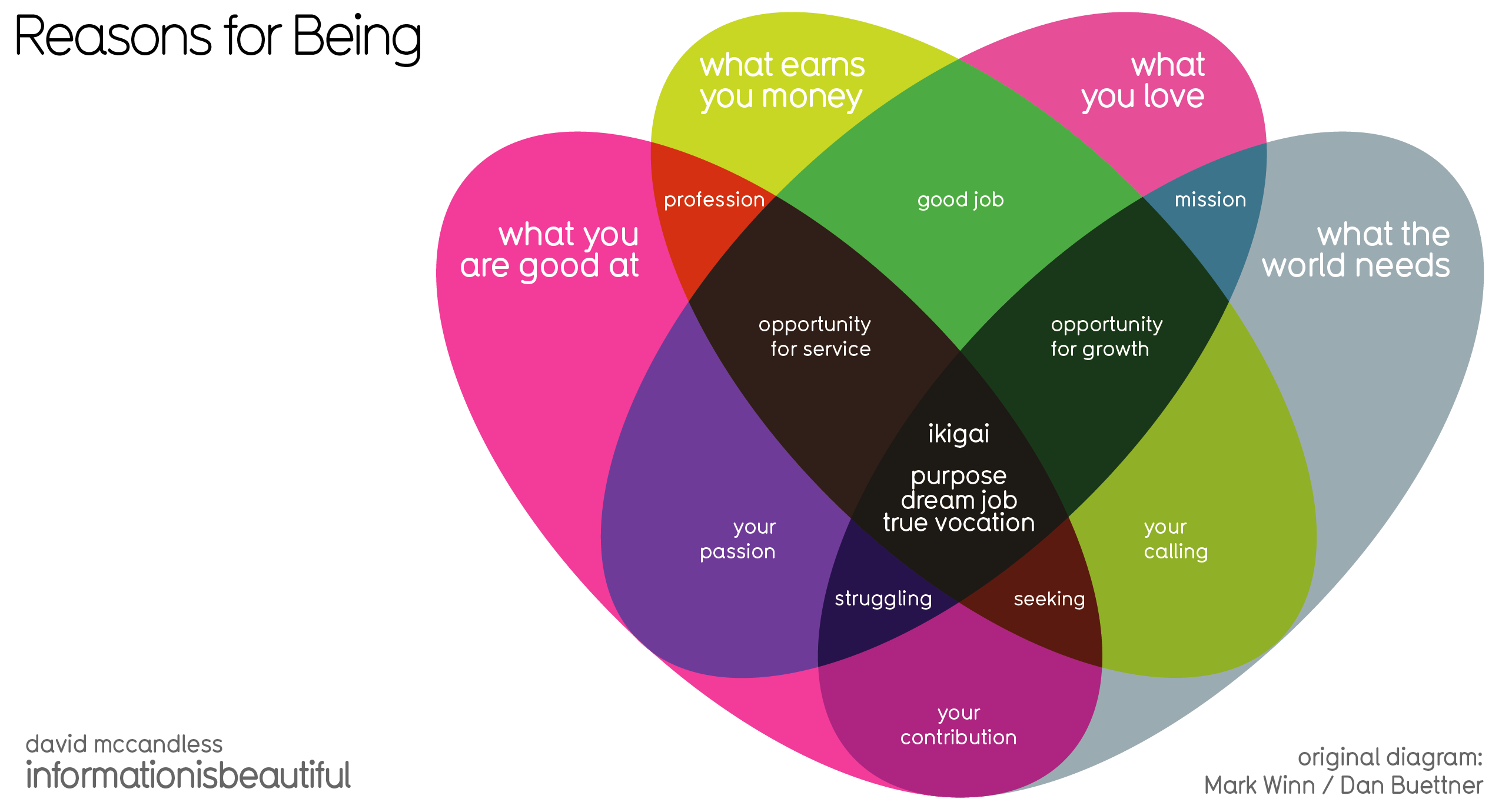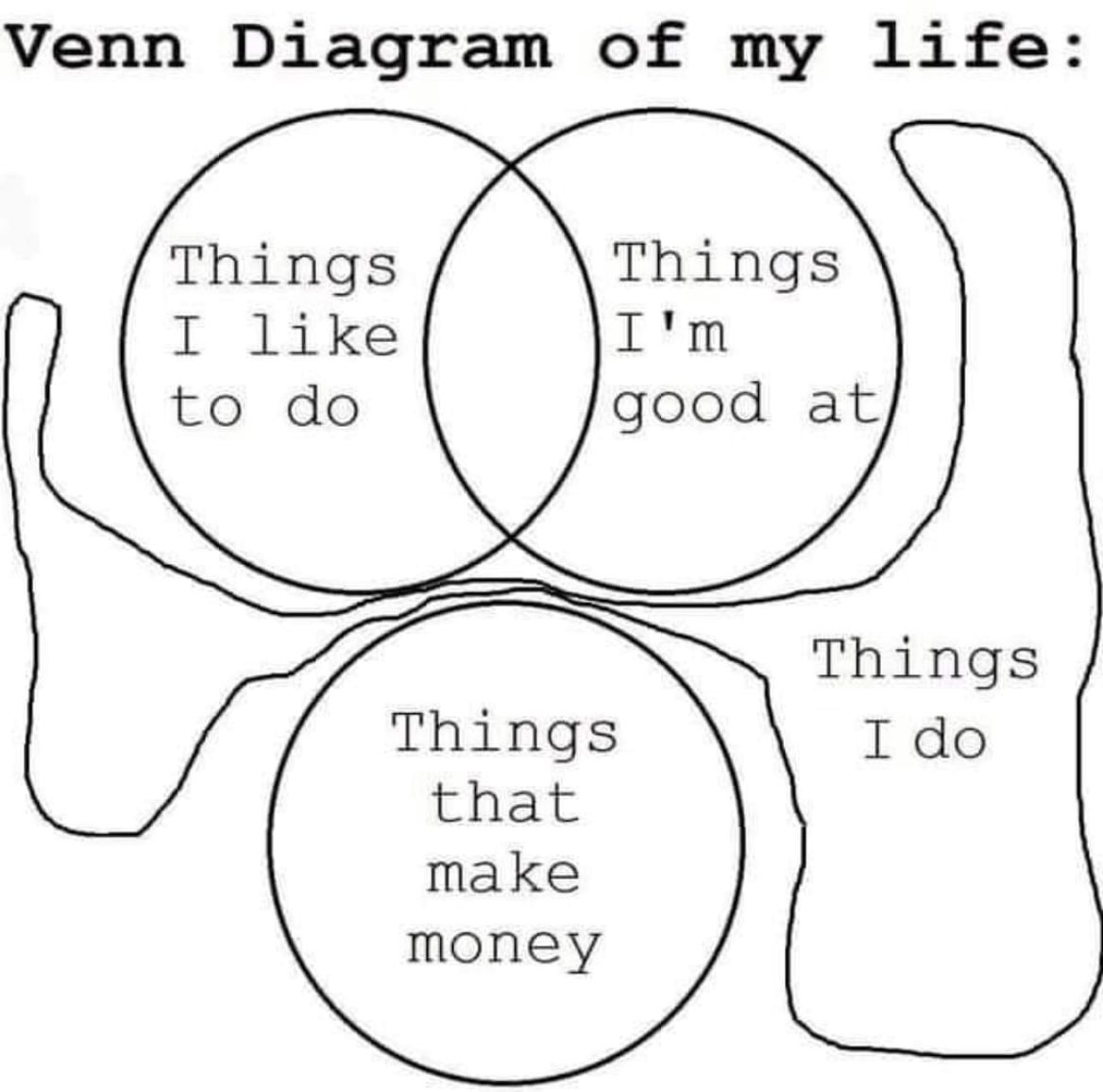I used to think that achieving ikigai was what success meant — the perfect balance of doing what you love, doing what you’re good at, and getting paid.
 source: Information is Beautiful
source: Information is Beautiful
The longer I do this creative entrepreneurship thing, the more I’m realizing ikigai might not actually be for me. As it turns out, I don’t actually want what I love to be what I’m good at that makes me money. I don’t know that I even want all of that to be something the world needs.
Actually, it’s ironic that a rich concept derived from Japanese philosophy would be used in an entrepreneurial/professional development context. In some ways, these western interpretations overemphasize the career/financial aspects of ikigai and distorts the philosophy to fit within these capitalist narratives about self-optimization and productivity. Its origins were more about personal fulfillment, community contribution, and living in harmony with your values and talent—how’d we get caught up using this as a tool for maximum output and justifying blending work and personal life?
When understanding ikigai in its fullest sense, it actually challenges purely capitalist values by emphasizing that financial compensation is only part of the equation; solely optimizing for income at the expense of other parts of your life makes it imbalanced.
This was probably a more accurate description of my life in a nutshell:
 source: Tweet
source: Tweet
I think a lot about my many interests and aspects of my life (design, art, product, tech; family, partner, friends, Recess, community, career, networks), and there are some things I purposely want to hold clear boundaries for.
Actually, coming to look at this ikigai venn diagram for the first time in 10 years made me realize that this no longer resonates with me at all. My purpose, dream job and true vocation are not the same things, so why do I have to force parts of my life to fit into this sliver of a quadruple diagram? I don’t like that money has soured a lot of my interests, and it frustrates me that I’ve boxed myself into believing that true harmony is falling into that one sliver. It’s not.
The reality of my balance is that many of my interests and aspects in life fall in many different parts of the venn diagram:
- art + design = what I love + what I’m good at (passion)
- community = what I love + what the world needs (mission)
- community programming = what I’m good at + what the world needs (contribution)
- product, tech = what earns me money + what I’m good at (profession)
Maybe in some ways these can eventually lean into ikigai. Or maybe all of it is just ikigai. In The Algebra of Wealth- A Simple Formula for Financial Security, Scott Galloway mentions not to follow your passion but follow your talent instead. Ironically, if you cross-reference the chart above, he’s technically right: profession is exactly at the intersection of what you’re good at and what makes you money, while passion is what you’re good at and what you love. So maybe it’s not about aiming for ikigai, it’s about aiming for your profession first, and the passion comes later. Of course, this is coming from a book called Algebra of Wealth, so there’s an obvious bias of “make money first, be happy later”. Also another thing to talk about bc money really does change lives (this coming from a low-income family that never taught my siblings and I how to handle money, let alone life-changing tech money).
I do believe in that though. A friend once told me, financial freedom is creative freedom. I used to think good art came from a place of struggle and pain, but I don’t think that’s true for everyone. I’ve come to realize that stability gives me a place to grow and be happy with the things I create. To tie this back to ikigai: I don’t want my creativity to be my main source of income. I think that forces me to create from a place of fear and scarcity rather than joy and will. I’ve seen my best work come from the latter, so I don’t want to sacrifice it. I want to protect it. By tangentally pursuing a career in software, I’m able to do something I sorta like and be really good at it, and make money doing it. I wouldn’t say this is my creative place.
Anywho, this aligns with everything else I’ve written about in pursuit of creative entrepreneurship/freelace/building a business: choose your own adventure. I have to remind myself that my circumstances, talent, and situation aren’t going to be the same as the next person’s. In building my own business — or really, finding my own work-life balance — I’m reminded that my rules and boundaries aren’t the same as another’s, and I have to honour myself before taking on someone elses’ framework. I must [embrace my own seasons](Embracing seasons).